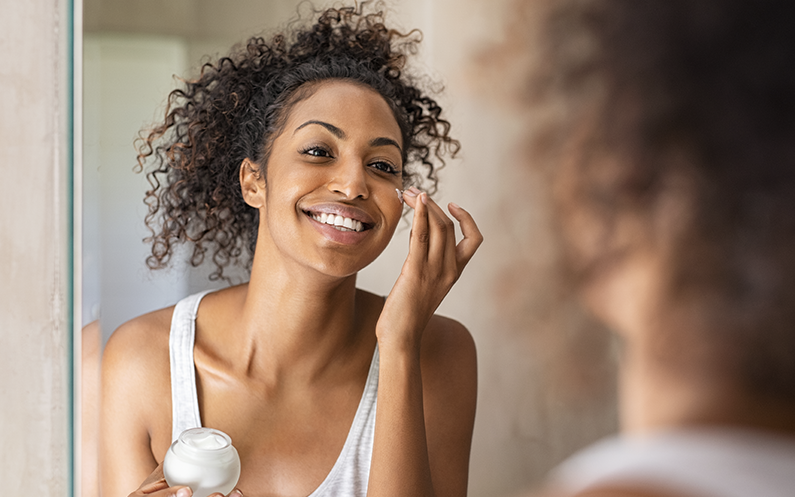With lockdown meaning we can’t access the usual treatments we might do, looking after our skin at home has never been more important.
And so, the team of Consultant Dermatologists at the Cadogan Clinic have shared their helpful advice to help navigate skin concerns through the home straight of lockdown.
- Don’t delay mole checks: Dr Susan Mayou, Consultant Dermatologist at the Cadogan Clinic, urges anyone noticing changes in their moles to have them checked immediately. There has been a 25 per cent rise in skin cancer patients at the Cadogan Clinic due to patients not accessing mole check services throughout the pandemic. Appointments can be made with the GP, who will be able to refer on if required. “This is a health check that should not be delayed until after lockdown; a thin melanoma of less than 0.75mm picked up early has a 95 per cent cure rate but this recovery rate reduces if the melanoma is thicker – time is of the essence,” Dr Mayou warned,
- Strip back DIY beauty: Having forgone facials, peels and aesthetic skin treatments for a long period of time, people are taking beauty matters into their own hands. Consultant Dermatologist, Dr Anjali Mahto, warns against using too many different products with active ingredients which can inadvertently cause damage to the skin barrier from DIY home treatments. She also cautions about where the advice is taken from. “Ensure any skincare advice you are receiving is from a qualified professional, rather than an influencer who lacks the evidence-based knowledge.”
- Manage stress levels: Mental health is at an all-time low for many people and stress is exacerbating inflammatory skin conditions, such as eczema, psoriasis and acne. Many people are reluctant to consult with a doctor throughout this time but doctors are still seeing patients with many are offering phone or video consultations. It’s important to not only maintain the treatment regime but also make an appointment with your doctor with any worrying skin concerns. Dr Mahto has also seen the effects of iron deficiency as a result of people embracing a plant-based diet, which can be particularly problematic in women and exacerbate skin conditions. She strongly urges adequate supplementation if dietary changes are being made.
- Maintain mask hygiene to help manage maskne: Dr Mayou is increasingly seeing more patients presenting with maskne and advises using disposable, paper masks or washing reusable masks in the washing machine after each use. She recommends thoroughly cleansing the skin in the morning and evening and choosing a lightweight, noncomedogenic moisturiser to prevent clogging of the pores.
- Use daily SPF: Even though time outside is restricted Dr Mayou urges people to continue wearing sunscreen, especially on bright sunny, albeit cold winter days. UVA rays are responsible for premature skin ageing, including the formation of wrinkles. They are present all year round and can even penetrate through glass. Wearing SPF on a daily basis is the cheapest and most effective, scientifically proven anti-ageing product available.
- Check used by dates for make-up and skincare: Most of us have reduced or ceased wearing makeup for the last 10 months. It’s a good idea to check the used by dates of makeup to ensure products haven’t expired by the time we resume the regular make-up routine. It’s also a good time to throw away old mascaras and either clean or replace make-up brushes, which can be a breeding ground for bacteria.


